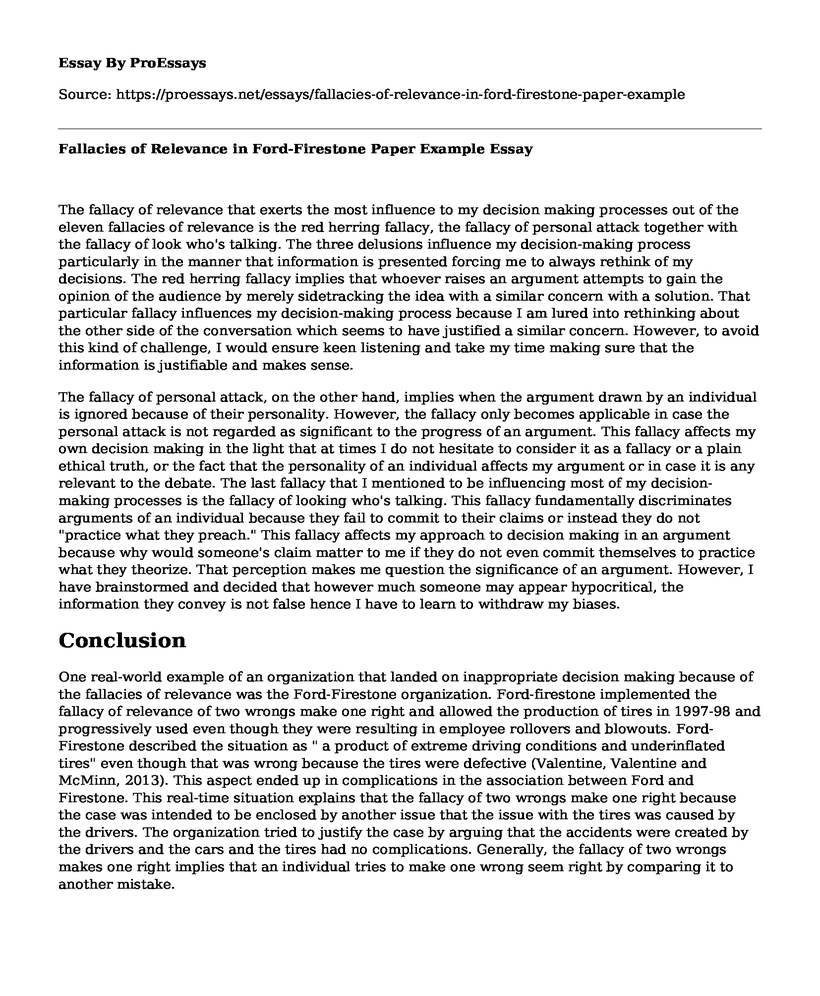The fallacy of relevance that exerts the most influence to my decision making processes out of the eleven fallacies of relevance is the red herring fallacy, the fallacy of personal attack together with the fallacy of look who's talking. The three delusions influence my decision-making process particularly in the manner that information is presented forcing me to always rethink of my decisions. The red herring fallacy implies that whoever raises an argument attempts to gain the opinion of the audience by merely sidetracking the idea with a similar concern with a solution. That particular fallacy influences my decision-making process because I am lured into rethinking about the other side of the conversation which seems to have justified a similar concern. However, to avoid this kind of challenge, I would ensure keen listening and take my time making sure that the information is justifiable and makes sense.
The fallacy of personal attack, on the other hand, implies when the argument drawn by an individual is ignored because of their personality. However, the fallacy only becomes applicable in case the personal attack is not regarded as significant to the progress of an argument. This fallacy affects my own decision making in the light that at times I do not hesitate to consider it as a fallacy or a plain ethical truth, or the fact that the personality of an individual affects my argument or in case it is any relevant to the debate. The last fallacy that I mentioned to be influencing most of my decision-making processes is the fallacy of looking who's talking. This fallacy fundamentally discriminates arguments of an individual because they fail to commit to their claims or instead they do not "practice what they preach." This fallacy affects my approach to decision making in an argument because why would someone's claim matter to me if they do not even commit themselves to practice what they theorize. That perception makes me question the significance of an argument. However, I have brainstormed and decided that however much someone may appear hypocritical, the information they convey is not false hence I have to learn to withdraw my biases.
Conclusion
One real-world example of an organization that landed on inappropriate decision making because of the fallacies of relevance was the Ford-Firestone organization. Ford-firestone implemented the fallacy of relevance of two wrongs make one right and allowed the production of tires in 1997-98 and progressively used even though they were resulting in employee rollovers and blowouts. Ford-Firestone described the situation as " a product of extreme driving conditions and underinflated tires" even though that was wrong because the tires were defective (Valentine, Valentine and McMinn, 2013). This aspect ended up in complications in the association between Ford and Firestone. This real-time situation explains that the fallacy of two wrongs make one right because the case was intended to be enclosed by another issue that the issue with the tires was caused by the drivers. The organization tried to justify the case by arguing that the accidents were created by the drivers and the cars and the tires had no complications. Generally, the fallacy of two wrongs makes one right implies that an individual tries to make one wrong seem right by comparing it to another mistake.
References
Valentine, R., Valentine, D., & McMinn, N. (2013). How Groupthink Influenced the Ford/Firestone Fiasco. Journal of International Diversity, 2013(1).
Cite this page
Fallacies of Relevance in Ford-Firestone Paper Example. (2022, Nov 07). Retrieved from https://proessays.net/essays/fallacies-of-relevance-in-ford-firestone-paper-example
If you are the original author of this essay and no longer wish to have it published on the ProEssays website, please click below to request its removal:
- A Report on Change Requirements for Fast Tack
- Essay Sample on Transformative Leadership Style
- Business Sustainability Plan - Paper Example
- Business Ethics in China Essay Example
- Essay Example on Amazon: Earth's Most Customer-Centric Organization
- Essay on Nursing Informatics: Roles of a Nursing Leader in Data Analysis & Quality Care
- Essay Example on Organizational Change: Stable Evaluation & Formal Planning







